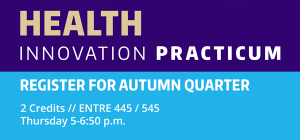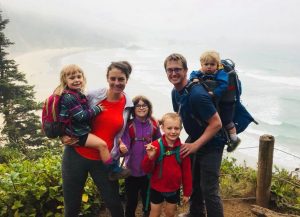Meet Will Canestaro, Health Innovation Practicum Instructor
New Health Innovation Practicum instructor Will Canestaro, managing director of the Washington Research Foundation, authored the following guest blog for the Buerk Center for Entrepreneurship. You can learn more about the ENTRE 445/545 course and other ways to prepare for the Health Innovation Challenge on the Buerk Center’s webpage, or by e-mailing Terri Butler at [email protected].
We sit on the verge of breakthroughs in gene editing, stem cell therapy, rational drug design, digital health, and others while also facing a huge problem with affordability and access. The opportunity to train and empower students who may one day work on these and other problems has me very excited to teach the Health Innovation Practicum (ENTRE 445/545) this fall. We will talk a lot about the power of entrepreneurship to address these challenges using promising new ideas and technologies, existing innovations, and services that improve patient experience within the healthcare system.
 Despite all these technical innovations the most pressing issue for most patients may not be whether they will receive a next-generation cure, but instead, whether they have access to health care and have the insurance to pay for it. Despite a quick pace of technological advancements, patients are concerned about how they can afford their medication, how can they quickly and confidentially communicate with a health care provider, or how they can compare different options for providers and treatments in a crowded and opaque market. While there is certainly a role for government in this conversation, some of the most immediate and arguably sustainable solutions to these problems will come from the private sector.
Despite all these technical innovations the most pressing issue for most patients may not be whether they will receive a next-generation cure, but instead, whether they have access to health care and have the insurance to pay for it. Despite a quick pace of technological advancements, patients are concerned about how they can afford their medication, how can they quickly and confidentially communicate with a health care provider, or how they can compare different options for providers and treatments in a crowded and opaque market. While there is certainly a role for government in this conversation, some of the most immediate and arguably sustainable solutions to these problems will come from the private sector.
My path to a career in healthcare innovation was not a direct one. When I was growing up in East Tennessee, my dream was to become a family physician serving a small community in Appalachia. I thought this was how I could have the greatest impact by directly caring for individual people. In my undergraduate pre-med years, and later studying anthropology at Oxford for my master’s degree, my perspective began to change. I realized the determinants of someone’s health were often broader than the direct care they received from their provider.
When I returned to the states, I took what I thought was a brief pause on the way to medical school to explore some of these alternative opportunities to improve health. I worked for two startups: Correlagen Diagnostics and Generation Health. Both were attempting to improve the lives of patients but in very different ways. Correlagen was offering a technology-driven approach to diagnosing patients with hereditary heart conditions. Generation Health was more service driven: helping payers understand the increasingly complex landscape of genetic tests. At my second startup, Generation Health, I had the opportunity to work with leading scientists, clinicians, and insurers to understand their unique perspectives and how each of them tries to improve healthcare sustainably given the tools that they have. Generation Health was ultimately acquired by CVS Caremark and my time there led me to the realization that to do the kind of work that I wanted to do, I would need further training.
I came to the PhD program in Health Economics and Outcomes Research at the University of Washington to learn the methods of assessing new healthcare technologies. I loved what I was learning but couldn’t completely leave behind the excitement of working with startups. During the course of my PhD studies, I worked with a number of new ventures around campus. It was this work that introduced me to the Washington Research Foundation (WRF), which is where I would work after graduation.
WRF works to translate promising innovations in the life sciences from Washington State research institutions into public use. We accomplish this goal through technology development grants to de-risk a technology before it is licensed to a start-up or other company as well as venture capital investments in start-ups arising from these technologies. In my job, I see new technologies and business ideas every day, and it has been an amazing opportunity to learn about the cutting edge of healthcare. My job and the entrepreneurs and researchers I get to work with every day have given me genuine excitement about healthcare’s future. I hope to share this excitement with students in the Health Innovation Practicum.

